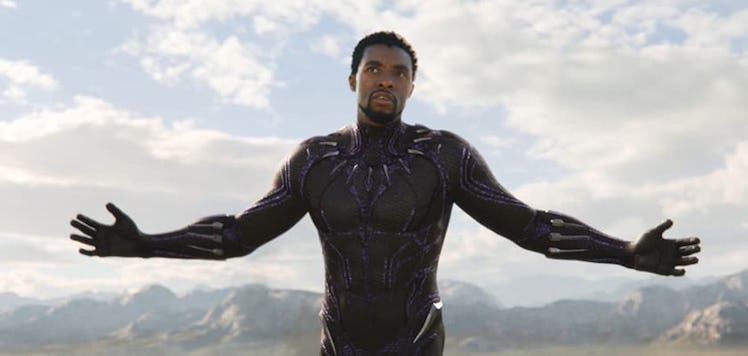5 Years Ago, Marvel Dropped Its Best Movie About Masculinity, Ever
Why we still love the first Black Panther.

On Febuary 16, 2018, Black Panther rocked the Marvel Cinematic Universe and dominated the box office. A refreshing take in a crowded genre, Black Panther was a movie about tradition and science, a fantastic adventure located at the intersection of the past and the future. It showcased an Afro-futurist society steeped in history and imagination, centered on the classic tale of a king reclaiming his throne from an evil usurper. But if you look past the super heroics, the soul of the film is all about what it means to be a man and a father.
Black Panther gave kids one of the strongest examples of a positive male role model in the entire MCU. The representation Chadwick Boseman’s T’Challa brought to Marvel was essential, making his death in 2020 especially hard on his young fans. The sequel to Black Panther, Wakanda Forever recently hit Disney+, but it’s time to revisit the brilliance of the first movie, too.
One of the smartest things about Black Panther is the way it unpacks various types of masculinity through T’Challa (Chadwick Boseman) and Erik Killmonger (Michael B. Jordan). These guys are biologically cousins but are brothers of the heart bound by their parental trauma. Their perspectives are shaped by nature and nurture, care, and neglect. From birth, T’Challa had every resource desired at his fingertips, including a steadfast royal father in T’Chaka (John Kani), whose life was cut short in 2016’s Captain America: Civil War. Killmonger had the opposite experience, deprived of having a dad to watch him grow and teach him to understand the world around him, let alone his roots. It’s what these two men did with their pain that formed who they became as adults, and showed what it meant to be a real man.
T'Challa accepted the crown of Wakanda after his father’s death but was unsteady wearing it. T’Chaka’s shadow loomed large over the nation during his reign and is a huge legacy to live up to. Through his relationship with his dad, T’Challa knows he has the tools to be a fair and strong ruler like him. When he learns T’Chaka was responsible for the death of Killmonger’s dad, that flips everything upside down, leaving the new King hurt and confused. How could his dad lie to him like that, and what’s that mean for the beliefs he learned from this man?
It's only through accepting his father as a more complex person who wasn’t infallible that T’Challa moves past this tarnished image and trusts not only his deceased father but himself. While he may not agree with every decision T’Chaka made, that same person taught him compassion, respect, and morality. Those lessons defined who T’Challa grew into, and made him a better man than his father was.
Conversely, Killmonger only saw things unilaterally and allowed his rage to devour him. Without someone to give him the same ethics as T’Challa, Killmonger languished in hate and selfishness. Even at death's door, his narcissism remained with his final defiant breath. Killmonger wore his anguish as armor, using his dad’s death as justification to make everyone around him suffer like him. T’Challa was able to drop his guard and have that tough conversation to openly address the pain, and begin to heal.
T’Challa versus Killmonger.
While T’Challa and Killmonger are extreme opposites when it comes to dealing with family trauma, the character of M’Baku shouldn’t be overlooked either. Winston Duke played a literal Alpha male, whose outward strength and gorilla grunts hid his heartache. The Jabari Tribe were always the neglected children of Wakanda, as M’Baku lamented how T’Challa was the first King to visit in centuries. In turn, he and his people rebelled against the technological splendors of Wakanda, isolating themselves among the mountain frost. His burden to carry was generational trauma from his father, his father before him, and so on. What M’Baku was really after was respect and acknowledgment.
When T’Challa spared M’Baku’s life during their duel, T’Challa acknowledged his rival and showed he valued him. This was the catalyst that granted M’Baku to have the inner strength to let go of his resentment and make a change.
M’Baku embodies the results of doing the work. No more would he be the sum of his father’s trauma, cutting out the hateful part in him to mend fences with T’Challa and bring a brighter tomorrow for all of their families. M’Baku was man enough to admit his view was wrong and perhaps his parents led him astray, allowing him to be open to the possibility of what could be instead of what was.
Winston Duke as M'Baku.
It's great to see a Marvel movie bring this reality check into the open. As much as Black Panther was inspiring on a number of levels, the deeper message is to build the strongest foundation possible between fathers and sons. I’d be remiss not to highlight the importance of seeing this shown through a Black lens, and I recommend this article from BET with quotes from the actors discussing the impact of this in their community.
Dads shouldn’t be afraid of having tough conversations with their kids, as well as admitting when they do something wrong. It may be scary to think how this revelation of emotional vulnerability could shatter their pristine image of your “manliness”, but honesty and openness can only strengthen the relationship. Be a real human and set a true example for your family. It’s okay to stumble, as long as you learn from the experience to be better in the future. That’s what sets apart the Kings from the imposters.
You can watch Black Panther on Disney+ right now